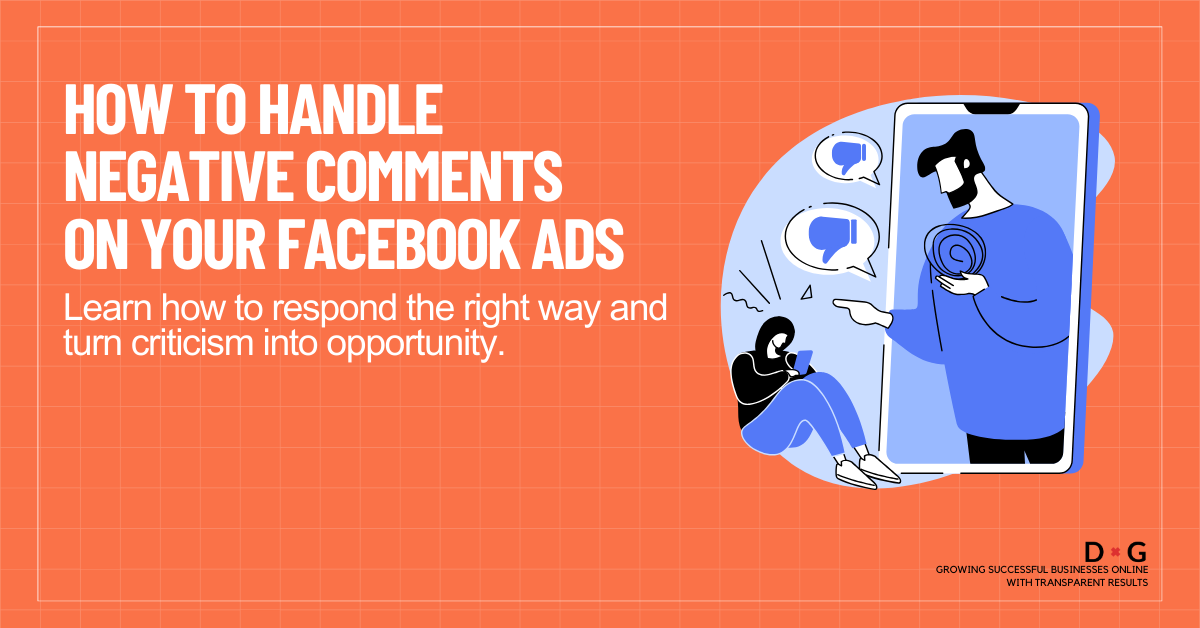
If you run Facebook ads, you will eventually receive negative comments. Some people may question your offer, others might express frustration, and some could be outright rude. You may even find competitors leaving damaging remarks to harm your reputation.
The key question is: Are you handling these comments the right way?
Ignoring negativity can hurt your brand, but responding the wrong way can make things worse.
In this blog, we will show you how to manage negative comments on your Facebook ads professionally and effectively.
Why Negative Comments Happen
When you advertise on Facebook, your ads reach a wide audience, including people who may not be interested in your product.
This means you may encounter:
- Skeptics who are unsure about your product or service.
- Customers who did not have a positive experience.
- Trolls who enjoy causing trouble.
- Competitors who try to damage your brand.
While negative comments can be frustrating, they do not have to ruin your ad campaign. In fact, if handled correctly, they can even help you build credibility and boost engagement.
Types of Negative Comments and How to Respond
Not all negative comments require the same approach. Some deserve a thoughtful response, while others are best ignored.
Here’s how to handle different types of negativity effectively.
Trolls and Spam
Some people comment on ads just to cause trouble. They may post irrelevant messages, rude jokes, or even spam links.
How to handle them:
- Ignore if the comment is harmless and does not impact your brand.
- Hide the comment so others cannot see it.
- Block the person if they repeatedly post spam or offensive content.
Best practice:
Avoid arguing with trolls. Engaging with them only gives them more attention.
Skeptical Customers
Some people will question whether your product or service is legitimate.
Comments like:
- “This looks like a scam.”
- “Does this actually work?”
These concerns are normal, especially for new brands. Instead of ignoring them, use them as an opportunity to build trust.
How to respond:
- Provide clear and honest answers.
- Share customer reviews or testimonials.
- Offer a guarantee or free trial if possible.
Example response:
“Thanks for your question! Many of our customers had the same concerns at first, but they love our product. You can check out their reviews here in the link (Link). Feel free to get in touch if you need to clarify anything!”
Angry Customers
Some people may have had a bad experience with your business or a similar product in the past. They may leave harsh comments to vent their frustration.
How to handle them:
- Stay calm and professional.
- Acknowledge their frustration.
- Offer to resolve the issue privately.
Example response:
“Hi Rose, we’re sorry you had this experience. Please send us a message so we can help sort this out for you.”
Best practice:
Never argue with an angry customer in the comments. A professional response shows that you care and can turn a negative situation into a positive one.
Competitor Sabotage
Unfortunately, some competitors may try to damage your reputation by posting false complaints or negative claims.
They may even promote their own products in your ad comments.
How to handle them:
- Check if the person has actually used your product.
- Hide or delete false comments.
- Report suspicious accounts to Facebook.
Best practice:
If a competitor is consistently targeting your ads, monitor their activity and consider adjusting your ad targeting to reduce their visibility.
Best Practices for Managing Negative Comments
Managing negative comments isn’t just about damage control, it’s about maintaining your brand’s reputation.
Follow these best practices to engage wisely, protect your ads, and turn negativity into opportunity.
Know When to Engage and When to Ignore
- Engage if a comment is a genuine concern.
- Ignore or hide spam, trolling, or competitor attacks.
Turn Objections into Sales
Negative comments about price or effectiveness can be used to highlight the value of your product.
Example response to “This is too expensive”:
“We focus on quality, and our product lasts longer than cheaper alternatives. Plus, we offer a money-back guarantee if you’re not satisfied.”
Don’t Take It Personally
Not everyone will like your product, and that is okay. Focus on your target customers and do not let negativity affect your confidence.
Know When to Delete or Hide Comments
- Delete offensive, false, or misleading comments.
- Hide comments that are negative but not harmful.
Use Feedback to Improve
If multiple people mention the same issue, it may indicate a problem with your messaging or product. Use this feedback to improve future ads.
Why Negative Engagement Can Still Boost Your Ads
Facebook’s algorithm favours engagement, even when it is negative.
This means that:
- More comments can increase your ad’s visibility.
- Responding professionally can build trust with potential customers.
- Addressing concerns publicly can show confidence in your product.
The key is to stay in control of the conversation and use comments to your advantage.
Conclusion
Negative comments on Facebook ads are inevitable, but they do not have to hurt your business. By responding professionally, engaging when necessary, and knowing when to ignore certain comments, you can protect your brand and even increase sales.
Check out our blog on Why Facebook Ads Fail & How to Fix Them.
Looking for a Meta advertising agency? At Digital Guide, we specialise in e-commerce and lead generation, helping your business grow with targeted strategies.
